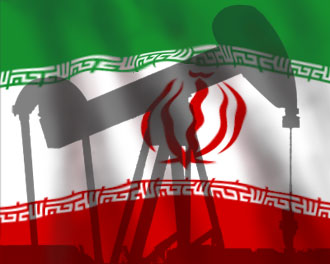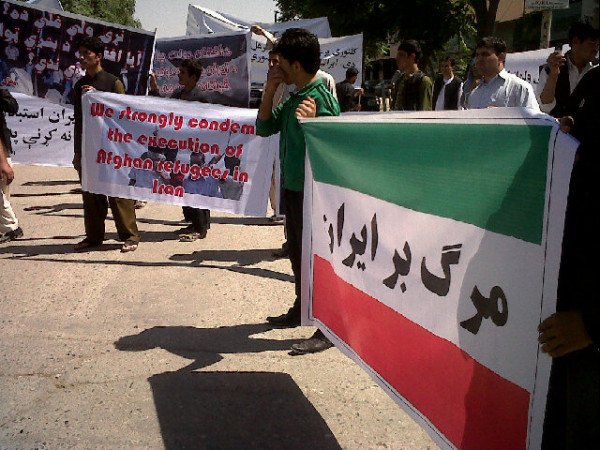The Latest from Iran (6 June): The Oil Squeeze
See also Iran Feature: The Week in Civil Society --- From #SaveMaleki to the "Shoot the Apostate" Video Games
Russia Audio Feature: Moscow's Manoeuvres With Iran --- Scott Lucas with Monocle 24
The Latest from Iran (5 June): The House Arrests
 2028 GMT: Political Prisoner Watch. Amir Hossein Alavi, a member of the student alumni group Advar Tahkim Vahdat and a supporter of the Freedom Movement of Iran, has been arrested after being summoned to Zanjan’s Intelligence Bureau.
2028 GMT: Political Prisoner Watch. Amir Hossein Alavi, a member of the student alumni group Advar Tahkim Vahdat and a supporter of the Freedom Movement of Iran, has been arrested after being summoned to Zanjan’s Intelligence Bureau.
1913 GMT: Devious West Watch. Sohrab Salehi, the head of the Basij Professors Organization has asserted that, by imposing sanctions, the West wants to present the Supreme Leader as the main cause of inflation in Iran.
Look for more of this in the near-future from higher-level officials. If the nuclear talks collapse --- which I think is probable, given today's signals --- and when the European Union's cut-off of imports of Iranian oil takes effect from 1 July, the Islamic Republic's officials will need someone to break for the escalating economic tensions in Iran. Since that "someone" cannot be Ayatollah Khamenei, the "West" will have the lead role of villain.
1442 GMT: Nuclear Watch. As we try to read the Iranian signals today (see 1335 and 1430 GMT), Laura Rozen points us to her article, with the "Western" perspective, from Tuesday:
Iranian media report...that international negotiators have not responded to Iranian requests for preparatory meetings ahead of the Moscow talks, scheduled for June 18-19th.
The claim is just not true, a European diplomat said....
Iran, in a May 29th letter to deputy international negotiator, the EU’s Helga Schmid, has requested an experts meeting ahead of the Moscow talks, the diplomat said.
Schmid’s office, in a June 4th letter, responded to the Iranian request, saying at this point only progress at a political level can advance the diplomatic process, the diplomat said.
“We think the issue is political and have proposed a direct Ashton-Jalili contact which they’ve stalled on so far,” the diplomat said, referring to the two sides’ chief nuclear negotiators, European Union foreign policy chief Catherine Ashton and Iran’s Saeed Jalili.
“We have told them that we need to advance at a political level,” the diplomat said. “We need a clear signal of Iranian readiness to engage on the substance of the E3+3 proposal. An experts meeting won’t do now as we saw when the progress made at lower levels in the run-up to Baghdad did not translate into more at the political level in Baghdad itself. Some things can only be done at a political level.”
So, as the Iranians have claimed, the 5+1 Powers have rejected a talk at deputies' level, seeing it as a diversion ahead of the Moscow conference.
But that leaves the question of a 5+1 response elevating, rather than dismissing, preparatory talks by suggesting that the lead negotiators meet. If that is true, has there been a mis-communication? Are the Iranians seeking a move in the Western position before an Ashton-Jalili encounter? Or is Tehran setting up the failure of the nuclear discussions, even before the sides sit down in Moscow?
1430 GMT: Nuclear Watch. This is now far more than a "curious signal" --- whether it is from genuine desperation, a set-up to blame European powers for the failure of nuclear discussions, or both, Iranian officials are on a major offensive criticising the European Union for avoiding preparatory talks for the formal meetings in Moscow on 18-19 June.
First, it was the deputy Iranian negotiator, Ali Bagheri (see 1335 GMT). Now it is the lead negotiator, Saeed Jalili --- from BBC Persian's BahmanKalbasi:
Jalili to #Ashton: "P5+1 delaying the meeting of experts, calls into question their desire to hold successful talks in Moscow" #Iran
— Bahman Kalbasi (@BahmanKalbasi) June 6, 2012
Press TV headlines, "Iran-P5+1 talks for sake of talks bear no results: Jalili".
1415 GMT: Nuclear Watch. Earlier today (see 1145 GMT) we noted the report that Ali Asghar Soltanieh, Iran's envoy to the International Atomic Energy Agency, was "optimistic" about a deal with the IAEA on inspections of Iran's nuclear facilities.
Not so fast.
Fars publishes the full text of Soltanieh's statement at the IAEA on Wednesday, and there is no sign of optimism. Instead, the speech is a litany of charges against the Agency:
The Agency is not supposed to play a role of watchdog and investigator interfering in the internal affairs and national security zone of the Member States....The inspectors which are supposed to verify fissionable nuclear materials and related nuclear facilities declared by Member States...are forced by a couple of states to be involved in intelligence activities, receiving fabricated information from the intelligence services of those certain countries....
There are number of other concerns, such as the weakness of the Agency's policymakers in dealing with the issue of nuclear security, which was taken hostage by ean xclusive approach depriving over 100 Member States from presence and contribution to such a global concern.
And then Soltanieh's defiance that Tehran will not give up enrichment on its territory, "Is there any doubt that Iran shall never yield to pressure to suspend its enrichment process for peaceful application?... We are however prepared to find out a face-saving solution for a breakthrough from the existing deadlock which [others have created."
So was Soltanieh playing "bad cop" and "good cop" with the West and the IAEA? Did Tehran's position change in 48 hours? Or is it others, rather than the Iranian envoy, who are mistakenly optimistic right now?
1345 GMT: Nuclear Watch. A curious signal from the Islamic Republic --- Radio Zamaneh reports:
Iran has invited the EU [European Union] to bilateral talks prior to the meeting between Iran and the world powers scheduled for later this month in Moscow.
ISNA reported on Tuesday that Ali Bagheri, who is the deputy to Saeed Jalili, the Head of Iran’s Supreme Council of National Security, has written to Helga Schmid, the deputy to EU foreign affairs chief Catherine Ashton, calling for bilateral negotiations.
Bagheri is quoted as saying: “The success of the Moscow meeting depends on paving the way with necessary preparations and developing a comprehensive and mutually accepted agenda.”
The report indicates that Iran sent a letter to the EU following the Baghdad talks in May and, when the letter drew no response, Tehran decided to write a second letter.
That letter stresses the urgency of arranging a bilateral meeting as the window of opportunity swiftly closes in advance of the Moscow talks.
Here's the vital piece of additional information --- Schmid and Bagheri had preparatory talks in early May, just before the disappointment of the formal talks between Iran and the 5+1 Powers in Baghdad. These were kept quiet, until journalist Laura Rozen was told by an unnamed "Western" diplomat about them, just before Baghdad.
So why are the Iranians going public now with their urgent desire to see the European Union's negotiator? A bit of public relations? Or is the EU, in contrast to early May, playing hard-to-get before the formal talks in Moscow?
1335 GMT: Nuclear Watch. Make of this what you will, but I think Beijing just told Tehran to show willingness for a deal over its uranium enrichment programme --- Premier Wen Jiabao has said after a meeting with President Ahmadinejad in Beijing today, "China opposes any Middle East country's push to acquire nuclear weapons and upholds that the Iranian nuclear issue should be addressed through diplomatic channels in an impartial way."
1145 GMT: Nuclear Watch. Ali Asghar Soltanieh, Iran's envoy to the International Atomic Energy Agency, has expressed optimism over Friday's meeting in Tehran with IAEA head Yukiya Amano over a protocol for Agency inspection of Iranian nuclear facilities.
"We will try to continue to work on the text of the structured approach. Hopefully we will be able to conclude it in a way that it will be...a good basis for our work in the future," Soltanieh said. "I'm always (an) optimist and I hope that the agency also takes into serious consideration our concerns."
Amano had said, after talks in Tehran on 21 May, that a deal was imminent; however, it did not emerge, and the talks were overshadowed within days by the stalemate in Baghdad between Iran and the 5+1 Powers (US, UK, France, Germany, China, and Russia) over uranium enrichment.
0655 GMT: Issues Abroad. David M. Herszenhorn, writing in The New York Times, offers a summary of the escalating tension in Iran's relations with Azerbaijan, with allegations of espionage, the withdrawal of ambassadors, and reports of Baku allowing Israel to use bases inside the country.
And this morning in Afghanistan, about 30 men demonstrated outside the Iranian Embassy in Kabul, protesting the execution of Afghans in the Islamic Republic.
0455 GMT: Nuclear Watch. Speaker of Parliament Ali Larijani has warned against pressure from the West, ahead of the next round of nuclear talks in Moscow on 18 and 19 June: “Creating a commotion in this relation by the Westerners and saying that the Moscow talks will be the deadline and that the Americans have prepared another resolution are nothing but an amateurish game."
US Treasury Undersecretary David Cohen, Washington's lead official on sanctions, has been in Israel this week discussing further measures. While there, he said, “If we don’t get a breakthrough in Moscow there is no question we will continue to ratchet up the pressure.”
Larijani questioned, “If you want to hold talks to resolve the issue, why have you determined the results of the negotiations in advance? “On the one hand you send messages, but on the other hand you create a political brouhaha. It is a political retrogression for the United States."
0440 GMT: We begin on the economic front with yet another pointer to the tightening squeeze on Iran over its oil exports. Turkey, a leading trade partner of Tehran, has slashed its imports of Iranian crude in May and June.
Turkey had purchased 270,000 barrels per day of Iranian oil in March and 249,000 bpd in April. However, the flow fell to 142,000 bpd in May and will remain at that level this month.
Turkey accounted for 7% of Iran's crude oil exports in 2011. In the first four months of this year, Turkey obtained about 58% of its almost six million tonnes in crude from the Islamic Republic
The European Union's ban on Iranian oil imports begins on 1 July. Turkey has applied to become an EU member but is not yet bound by its decisions.
EU imports of Iranian crude fell in April to around 350,000 bpd compared to more than 700,000 bpd at the same point last year.

 Wednesday, June 6, 2012 at 20:13
Wednesday, June 6, 2012 at 20:13
Reader Comments